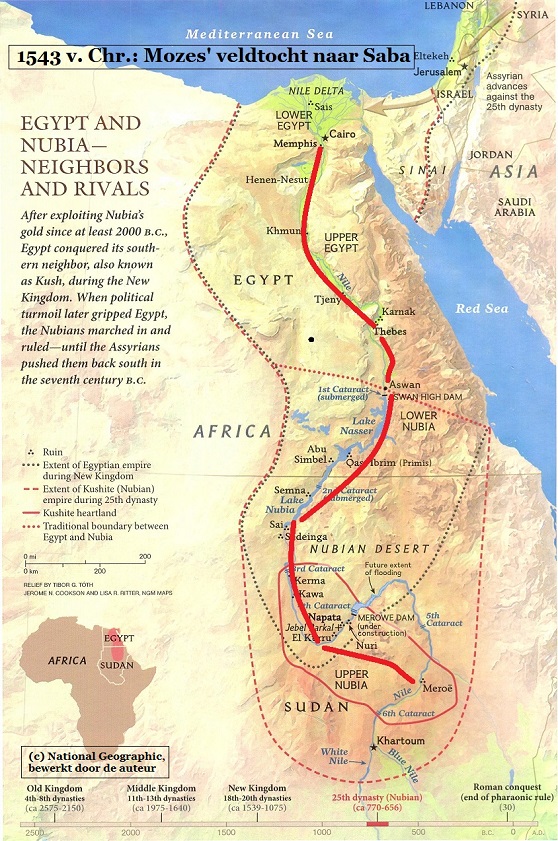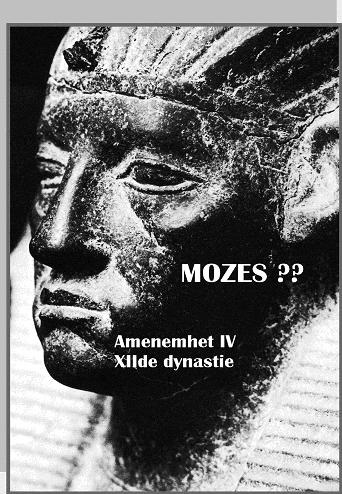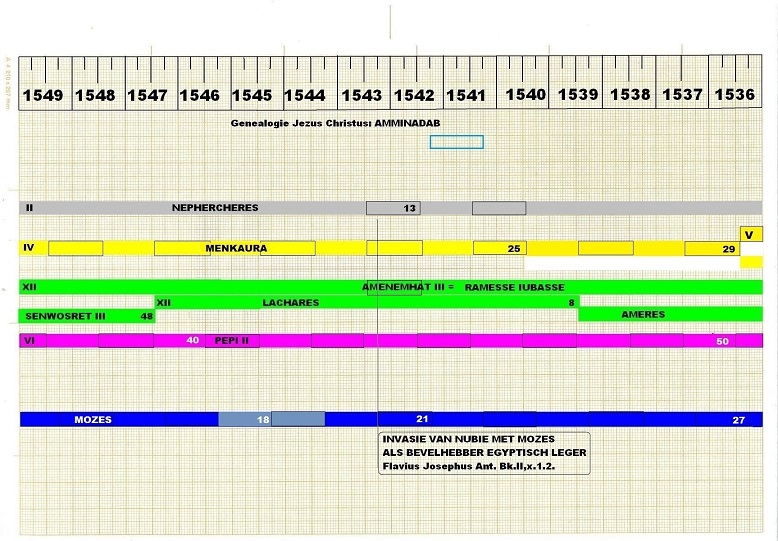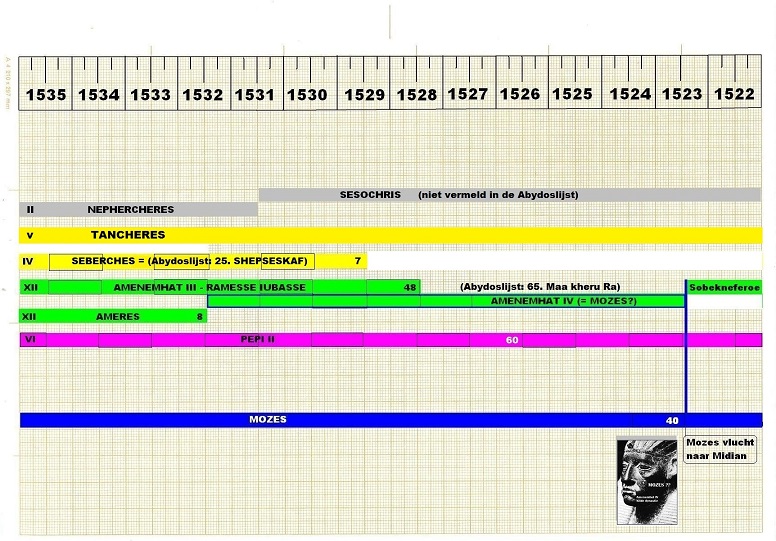|
Flavius
Josephus, Joodse Oudheden, Boek II,x.1-2 (vertaling van het Grieks naar het
Engels door William Whiston, 1667/1752)
HOW MOSES MADE WAR WITH THE ETHIOPIANS,
1. MOSES,
therefore, when he was born, and brought up in the foregoing manner, and came to the age of maturity, made
his virtue manifest to the Egyptians; and showed that he was born for the
bringing them down, and raising the Israelites. And the occasion he laid hold
of was this: - The Ethiopians, who
are next neighbors to the Egyptians, made an inroad into their country, which
they seized upon, and carried off the effects of the Egyptians, who, in their
rage, fought against them, and revenged the affronts they had received from
them; but being overcome in battle, some of them were slain, and the rest ran
away in a shameful manner, and by that means saved themselves; whereupon the Ethiopians followed after
them in the pursuit, and thinking that it would be a mark of cowardice if
they did not subdue all Egypt, they went on to subdue the rest with greater
vehemence; and when they had tasted the sweets of the country, they never left
off the prosecution of the war: and as the nearest parts had not courage enough
at first to fight with them, they proceeded
as far as Memphis, and the sea itself, while not one of the cities was able
to oppose them. The Egyptians, under this sad oppression, betook themselves to
their oracles and prophecies; and when God had given them this counsel, to make
use of Moses the Hebrew, and take
his assistance, the king commanded his daughter to produce him, that he might be the general (22)
of their army. Upon which, when she
had made him swear he would do him no harm, she delivered him to the king, and
supposed his assistance would be of great advantage to them. She withal
reproached the priest, who, when they had before admonished the Egyptians to
kill him, was not ashamed now to own their want of his help.
2. So Moses, at the persuasion both of Thermuthis and the king himself,
cheerfully undertook the business: and the
sacred scribes of both nations were glad; those of the Egyptians, that they
should at once overcome their enemies by his valor, and that by the same piece
of management Moses would be slain; but those of the Hebrews, that they should escape from the Egyptians, because
Moses was to be their general. But Moses prevented the enemies, and took and
led his army before those enemies were apprized of his attacking them; for he
did not march by the river, but by land, where he gave a wonderful
demonstration of his sagacity; for when the ground was difficult to be passed
over, because of the multitude of serpents, (which it produces in vast numbers,
and, indeed, is singular in some of those productions, which other countries do
not breed, and yet such as are worse than others in power and mischief, and an
unusual fierceness of sight, some of which ascend out of the ground unseen, and
also fly in the air, and so come upon men at unawares, and do them a mischief,)
Moses invented a wonderful stratagem to
preserve the army safe, and without hurt; for he made baskets, like unto
arks, of sedge, and filled them with ibes, (23) and carried them along
with them; which animal is the greatest enemy to serpents imaginable, for they
fly from them when they come near them; and as they fly they are caught and
devoured by them, as if it were done by the harts; but the ibes are tame creatures, and only enemies to the serpentine
kind: but about these ibes I say no more at present, since the Greeks
themselves are not unacquainted with this sort of bird. As soon, therefore, as
Moses was come to the land which was the breeder of these serpents, he let
loose the ibes, and by their means repelled the serpentine kind, and used them
for his assistants before the army came upon that ground. When he had therefore
proceeded thus on his journey, he came upon the Ethiopians before they expected
him; and, joining battle with them, he beat them, and deprived them of the
hopes they had of success against the Egyptians, and went on in overthrowing
their cities, and indeed made a great slaughter of these Ethiopians. Now when the Egyptian army had once tasted of
this prosperous success, by the means of Moses, they did not slacken their
diligence, insomuch that the Ethiopians were in danger of being reduced to
slavery, and all sorts of destruction; and
at length they retired to Saba, which was a royal city of Ethiopia, which
Cambyses afterwards named Mero, after the name of his own sister. The place
was to be besieged with very great difficulty, since it was both encompassed by
the Nile quite round, and the other rivers, Astapus and Astaboras, made it a
very difficult thing for such as attempted to pass over them; for the city was
situate in a retired place, and was inhabited after the manner of an island,
being encompassed with a strong wall, and having the rivers to guard them from
their enemies, and having great ramparts between the wall and the rivers,
insomuch, that when the waters come with the greatest violence, it can never be
drowned; which ramparts make it next to impossible for even such as are gotten
over the rivers to take the city. However, while Moses was uneasy at the army's
lying idle, (for the enemies durst not come to a battle,) this accident happened:
- Tharbis was the daughter of the king of the Ethiopians: she happened to see
Moses as he led the army near the walls, and fought with great courage; and
admiring the subtility of his undertakings, and believing him to be the author
of the Egyptians' success, when they had before despaired of recovering their
liberty, and to be the occasion of the great danger the Ethiopians were in,
when they had before boasted of their great achievements, she fell deeply in love with him; and upon the prevalency of that
passion, sent to him the most faithful of all her servants to discourse with
him about their marriage. He
thereupon accepted the offer, on condition she would procure the delivering up
of the city; and gave her the assurance of an
oath to take her to his wife; and that when he had once taken possession of
the city, he would not break his oath to her. No sooner was the agreement made,
but it took effect immediately; and when Moses had cut off the Ethiopians, he
gave thanks to God, and consummated his marriage, and led the Egyptians back to
their own land.
(22) This history of Moses, as general of the Egyptians
against the Ethiopians, is wholly omitted in our Bibles; but is thus by
Irenaeus, from Josephus, and that soon after his own age: "Josephus
says, that when Moses was nourished in the palace, he was appointed general of
the army against the Ethiopians, and conquered them, when he married that
king's daughter; because, out of her affection for him, she delivered the city
up to him." See the Fragments of Irenaeus. ap. edit. Grab. p. 472. Nor
perhaps did St. Stephen refer to anything else when he said of Moses, before he
was sent by God to the Israelites, that he was not only learned in all the
wisdom of the Egyptians, but was also mighty in words and in deeds, Acts 7:22.
(23) Pliny
speaks of these birds called ibes;
and says, "The Egyptians invoked them against the serpents," Hist.
Nat. B. X. ch. 28. Strabo speaks of
this island Meroe, and these rivers Astapus and Astaboras, B. XVI. p. 771, 786;
and B XVII. p. 82].

Het is alleen de oudheidhistoricus Flavius Josephus
die het verhaal van Mozes als generaal van het Egyptische leger brengt. De
Bijbel zwijgt over dit feit. Hoewel Stefanus in het Bijbelboek Handelingen misschien
een hint in die richting geeft:
Handelingen 7:20 Te dien tijde werd Mozes geboren en hij was schoon voor
God; drie maanden werd hij opgevoed in zijns vaders huis. 21 En toen hij te
vondeling was gelegd, nam de dochter van
Farao hem aan en liet hem als haar eigen zoon opvoeden. 22 En Mozes werd
onderwezen in alle wijsheid der Egyptenaren en was machtig in zijn woorden en werken. 23 Toen hij nu de
leeftijd van veertig jaar bereikt had, kwam het in zijn hart op, naar zijn
broeders, de kinderen Israëls, om te zien. (NBG Vertaling 1951)
Flavius Josephus beschrijft de invasie van Egypte door
de Ethiopiërs, die vanuit het zuiden helemaal naar Memfis oprukten en daarna
zelfs de Middellandse Zee bereikten. Het Egyptische leger was eerder in het
zuiden aan de grens verslagen en het land lag als een gevolg open voor de
Ethiopiërs die schijnbaar moeiteloos tot Beneden-Egypte konden doorstoten.
Egypte leek verloren. Radeloos raadpleegden de Egyptenaren hun orakels en
profetieën, naar een oplossing. Josephus schrijft dat God farao adviseerde om
de Hebreeër Mozes tot generaal over het leger aan te stellen. Daarna lezen we dat
Mozes de opdracht van farao aanvaard en het Egyptische leger over land, tegen
de Ethiopiërs laat oprukken. De Ethiopiërs worden verslagen en naar hun land
teruggedreven. Vervolgens rukt Mozes Ethiopië binnen en belegerd hun hoofdstad
Saba. Een belegering die door Josephus, als een gevolg van de ligging aan de
Nijl daar, de zijrivieren en de versterkingswerken van de stad, als zeer moeilijk beschreven wordt. De verovering van
Saba door Mozes werd pas mogelijk wanneer de dochter van de koning van de
Ethiopiërs met de (Griekse) naam Tharbis, de stad aan Mozes uitleverde op
voorwaarde dat hij onder eed beloofde haar tot vrouw te nemen. Mozes stemde
toe, veroverde de stad en keerde met zijn Ethiopische vrouw en het leger
naar Egypte terug. Dat Mozes een Ethiopische vrouw had
lezen we in het Bijbelboek Numeri 12:1 Mirjam
nu sprak met Aäron over Mozes naar aanleiding van de Ethiopische vrouw, die hij genomen had, want hij had een
Ethiopische vrouw genomen,
De bedoeling van dit artikel is het verhaal van
Flavius Josephus op zijn historische waarheid te toetsen, en op de tijdsbalk te
plaatsen. Zoals eerder opgemerkt is het alleen Flavius Josephus die ons deze
geschiedenis overlevert. Vooreerst moet ik opmerken dat de benaming Ethiopië
uit de oudheid niets van doen heeft met de moderne staat Ethiopië in
Oost-Afrika. Het Ethiopië van de oudheid plaatsen we op een moderne kaart in
het noorden van Soedan. De beschreven hoofdplaats Saba werd veel later door de
Pers Kambyses omgedoopt naar Meroë en ligt in de Soedan. In de grondtekst van
de Bijbel staat er Kus, wat met Ethiopië vertaald werd. Kus was een zoon van
Cham, één van de drie zonen van Noach (Genesis 10:6-7). En uit Kus was Nimrod
voortgekomen, een tegenstander van Sem, uit wiens lijn de Israëlieten waren
voortgekomen. En vandaar vermoedelijk de tegenspraak van de zuster van Mozes;
Mirjam in verband met de Ethiopische vrouw Tharbis van Mozes. Ik neem aan dat
de veertigjarige Mozes bij zijn vlucht naar Midian, de Ethiopische Tharbis aan
het hof van farao heeft achtergelaten. In Midian huwde hij met de dochter van
Reüel; Sippora die hem later een zoon baarde; Gersom (Exodus 2:17-22). Veertig
jaar later, op tachtigjarige leeftijd werd Mozes door God geroepen om de
Israëlieten uit Egypte te leiden en het is vanuit het Bijbelboek Numeri
duidelijk dat Mozes bij de Exodus zijn inmiddels bejaarde Ethiopische vrouw
Tharbis heeft meegenomen. We moeten hierbij bedenken dat als een gevolg van de
tien plagen, het land Egypte volkomen geruïneerd was, en de laatste plaag
betekende de dood van al het eerstgeborene in Egypte. De Egyptenaren zouden
zich zeker en vast op de Ethiopische vrouw van Mozes gewroken hebben.
Aangezien we geen andere bron hebben om het geschiedenisverhaal
van Mozes als generaal van het Egyptische leger, naar waarheid te toetsen
blijft alleen de plaatsing op de tijdsbalk over en via deze oefening de toets
of het historische kader klopt, in overeenstemming is, met andere historische
feiten die bekend zijn. De Engelse vertaler van de werken van Flavius Josephus
uit het Grieks, William Whiston, paste dit in de achttiende eeuw al toe door bijvoorbeeld
in zijn vertaling voetnoten met commentaar te plaatsen, verwijzende naar
oudheidauteurs zoals Plinius en Strabo om een en ander betreffende de vogel de Ibes
en betreffende de ligging van het eiland Meroë te verklaren.
De honderdtwintigjarige levensloop van Mozes is op de
tijdsbalk verankerd met de Exodusdatum in het jaar 1483 v. Chr., hij was dan
tachtig jaar oud. Zijn geboorte en eerste levensjaar valt aldus in het jaar
1563/1562 v. Chr. De eerste veertig jaar bracht hij als de zoon van farao s dochter,
aan het hof van farao door. Een dochter die Josephus de (Griekse) naam
Thermuthis geeft. Over Mozes, als prins van Egypte schreef ik al eerder op 02-03-2014 op dit blog een artikel, zie
link: http://www.bloggen.be/robertdetelder/archief.php?startdatum=1393196400&stopdatum=1393801200
De invasie van de Ethiopiërs wordt door Josephus
geplaatst in het jaar dat Mozes de leeftijd van volwassenheid bereikt had. In
de Bijbel is dat vanaf het twintigste levensjaar en deze vaststelling plaatst de invasie van de Ethiopiërs in het jaar 1543
v. Chr. De vlucht naar Midian van Mozes geschiedde twintig jaar later in
1523 v. Chr.
Laat ons nu onderzoeken of dit past in de revisie van
de geschiedenis van de oudheid. In mijn werk; TIJD en TIJDEN, 2015, hoofdstuk
Pitom en Raämses, blz. 89.
(Zie link: http://boekscout.nl/shop/ViewProduct.aspx?bookId=5579 ),
geef ik de volgende reconstructie voor de farao s van
de twaalfde dynastie op de tijdsbalk door:
Regeringsjaartallen voor Christus: Sothis-lijst identificatie:
Amenemhat I 1693/1664 29
Rameses
Senwosret I 1664/1619 45 Ramessemenes
Amenemhat II 1649/1614 35
Usimares
Senwosret II 1618/1595 23
Ramesseseos
Senwosret III 1595/1547 48 Ramessameno
Amenemhat III 1576/1528 48 Ramesse Iubasse
Amenemhat IV 1531/1523 8 breuk in de lijst
Sobekneferoe 1523/1519
4
De twaalfde dynastie was volgens de
onderzoeker Donovan Courville de dynastie die de farao van de verdrukking
leverde; namelijk Senwosret III. Het was de dochter van zijn opvolger Amenemhat
III met de (Egyptische) naam Sobekneferoe, die die volgens hem, Mozes als zoon
adopteerde en aldus Mozes tot kroonprins van Egypte maakte. Op de tijdsbalk
linkt Courville de vlucht van Mozes naar Midian met het einde van de
(co)regeerperiode van Amenemhat IV. Ook volgens de orthodoxe egyptologie is het
einde van de twaalfde dynastie met heel wat vraagtekens omgeven (Egypt of the
pharaohs, Sir Alan Gardiner, 1961, Chapter VI, The rise and fall of the Middle
Kingdom, blz.141), en is er een vermoeden van een familievete. Maar indien
Courville gelijk heeft zijn we bovendien in bezit van een afbeelding van Mozes
in een bewaard beeld van farao Amenemhat IV. Ik schrijf indien, want
absoluut bestaat hier geen zekerheid over.

In
mijn studie van de herziening van de geschiedenis van de oudheid toon ik aan
dat het Egyptische Oude Rijk en het Midden-rijk contemporain waren en beide perioden
als een gevolg van de exodus en de invasie van de Hyksos/Amalekieten aan hun
einde komen. In mijn werk TIJD en TIJDEN, blz. 107, toon ik aan dat farao
Senwosret III van de twaalfde dynastie van het Midden-rijk, de handlanger is
(en ondergeschikt) van farao Pepi II van de zesde dynastie.

Wat
de twaalfde dynastie betreft heb ik de ankerpunten die Courville leverde op de
tijdsbalk uitgewerkt. De machtige, en tegenwoordig zeer goed gedocumenteerde,
farao Senwosret III kwam aan zijn einde in 1547
v. Chr. De geschiedenis die Flavius Josephus brengt met de invasie van
Egypte door de Ethiopiërs past hier aldus in het chronologisch raamwerk. Het is
na de dood van Senwosret III namelijk goed mogelijk dat de Ethiopiërs enkele
jaren later hun kans waagden met de invasie van Egypte. De opvolger van Senwosret
III was farao Amenemhat III die daarvoor volgens mijn revisie, al een hele tijd
als co-regent de troon met Senwosret III gedeeld had. Over Amenemhat III is heden
heel wat minder historische informatie beschikbaar. Zo ook over zijn opvolger
Amenemhat IV, een farao over wie blijkbaar nog minder geweten is. Er is aldus
ruimte om de geschiedenis, zoals Flavius Josephus die brengt, in te lassen.

In
het orthodoxe model is het echter ondenkbaar dat ten tijde van de achttiende en/of negentiende dynastie, Mozes als generaal
van het Egyptische leger een offensief naar Ethiopië geleidt zou hebben.
Volgens het gefabriceerde raamwerk van de orthodoxe egyptologie is farao Seti I
een mogelijke kandidaat als de farao van de verdrukking en diens zoon Ramses II
als de farao van de Exodus. De regeerperioden van deze faraos zijn echter
heden goed gedocumenteerd en hier bestaat geen vermelding naar (of is er ruimte
voor) een door een dochter van farao geadopteerde Aziaat, die het met zijn
twintig jaar tot de generaal van het Egyptische leger schopt. Voor Hollywood is
dit nooit een probleem geweest. Zij brengen met Mozes als prins van Egypte ten
tijde van, en in het historische kader van de negentiende dynastie, een in
wezen voor hen fictief verhaal. Orthodoxe Egyptologen halen hierbij de
schouders op en zien het louter als entertainment. De Bijbel is voor hen ook louter
een godsdienstig boek zonder veel historische waarde.
Alleen het revisionisme van de geschiedenis van de
oudheid plaatst alles in de juiste context en geeft ruimte op de tijdsbalk voor
het optreden van Mozes als generaal van het Egyptische leger.
Wordt vervolgd
Met
vriendelijke groet,
Robert De
Telder
|

